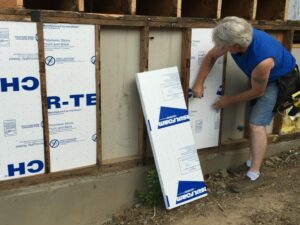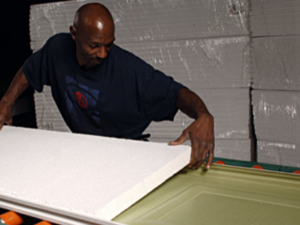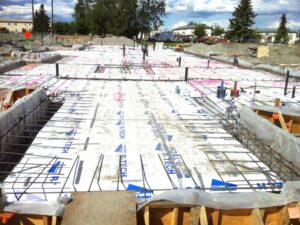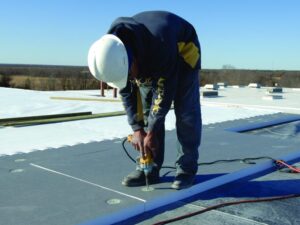Garage Insulation Demystified
 With the colder months upon us, many do-it-yourselfers are breaking out the space heaters for their garage workshops. That said, a space heater is an inefficient and costly means of warmth if the garage is not properly insulated. To optimize any heating (or cooling) methods put in place, experts recommend installing expanded polystyrene (EPS) rigid foam insulation. As a high-caliber insulation material, EPS will support a more comfortable indoor temperature in a garage workshop during both the winter and summer months while delivering tangible energy and cost-savings.
With the colder months upon us, many do-it-yourselfers are breaking out the space heaters for their garage workshops. That said, a space heater is an inefficient and costly means of warmth if the garage is not properly insulated. To optimize any heating (or cooling) methods put in place, experts recommend installing expanded polystyrene (EPS) rigid foam insulation. As a high-caliber insulation material, EPS will support a more comfortable indoor temperature in a garage workshop during both the winter and summer months while delivering tangible energy and cost-savings.
For those DIYers who may be insulating a home garage for the first time this winter, we’ve answered a few commonly asked questions to demystify garage insulation.
What is the best way to insulate a garage?
Insulating the garage door is a great place to start because it is typically the largest uninsulated surface area of a house. To underscore this recommendation, the experts at The Spruce estimate that insulating a garage door can affect the temperature in a garage by 20 degrees—meaning insulation can keep the garage warmer in the winter months and cooler in the summer. In addition, insulating this surface area doesn’t just increase a home’s energy efficiency but it also helps reduce interior noise. Insulated garage doors dampen noise leaving the garage as well as noise entering it, which is perfect for DIYers who love power tools, garage bands, or anyone who wants a quiet refuge.
Pre-configured garage door insulation kits are one of the easiest and most cost-effective ways to insulate a garage door. These kits can be customized and installed with common household tools, so they are perfect for those new to working with insulation.
Is EPS rigid foam the best for garage door insulation?
EPS delivers exceptional thermal performance with R-values typically ranging from 3.6 to 4.2 per inch, which helps make homes more energy efficient. In addition, this material does not lose its R-value over the years, unlike other materials that can lose up to 30% of their original insulating capabilities. Using EPS rigid foam for garage insulation will help regulate indoor temperatures for years to come.
Further, EPS rigid foam is environmentally friendly. The material offers performance in a clean package as it is one of the few types of building insulations made without formaldehyde or ozone-depleting HCFCs. Because of this, Garage Door Insulation Kits that use EPS help promote a cleaner, healthier environment for all.
Turn your garage into part of your home
To help shore up a home’s energy drains, insulating a garage door can have multiple benefits, from decreased overall energy costs to increased noise reduction. Uncomplicated to install and available at home improvement stores like Lowes and Menards, garage door kits from Insulfoam are the perfect first step in upgrading any home’s insulation.
Get your garage insulation project started by watching our Easy Weekend Project breakdown and step-by-step video.





